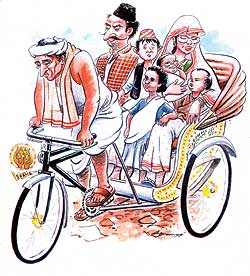 One of the very first acts of the post-Taleban regime of Kabul was to send an SOS to New Delhi for musical instruments to record Afghanistan's new national anthem. If ever there was any doubt about Kandahar being a part of South Asia, it was dispelled by the request of Hamid Karzai's cultural ministry for a set of harmonium, tabla, sarod, sitar, tanpura, surmandal, sarangi, pakhawaj, flute and dholak.
One of the very first acts of the post-Taleban regime of Kabul was to send an SOS to New Delhi for musical instruments to record Afghanistan's new national anthem. If ever there was any doubt about Kandahar being a part of South Asia, it was dispelled by the request of Hamid Karzai's cultural ministry for a set of harmonium, tabla, sarod, sitar, tanpura, surmandal, sarangi, pakhawaj, flute and dholak. There is a fundamental unity between the cultures of this region, the inheritor of a civilisation that once extended from Kashmir to Colombo, and from Bamiyan to Burma-and exported its beliefs across the seas to Bali, and beyond the Himalaya to Beijing. Despite millennia of natural upheaval and the rise and fall of several empires, the civilisational commonality of our cultures remains intact. Had Jawaharlal Nehru not appropriated the name India for his republic, perhaps we would all have been proud to call ourselves "Indic". Now we have to make do with the expression South Asian so as not to offend the patriotic sensibilities of people insecure about their identity in the young nation-states of this region.
Sadly, ever since Bill Clinton declared South Asia "one of the world's most dangerous regions", it has become even more dangerous. National politics has played havoc with the civilisational unity between the peoples of this region. To forge a common identity based on politics is thus fundamentally flawed. The likelihood of a United States of South Asia any time soon does not appear to be a realistic possibility.
Future unity based on the economic commonality of nation-states in this part of the world is also a mirage. Despite all talk of SAPTA and SAFTA, the emergence of a South Asian Union patterned after the European Union looks remote. Forget about a union, even an association like ASEAN is difficult to achieve when there is so much acrimony between the top leaders of SAARC member states. When even Indians need a passport to fly smoothly into Kathmandu-mercifully, a visa is not a requirement as yet-you can rest assured that not even religion is a unifying factor in a region dominated by parochial politics.
Ironically, to chart a common future, all we need to do is look at our collective pasts where empires competed with each other, even while accepting the harmony between their cultures. Aurangzeb is an aberration. It was not the sword of Islam that conquered Hindustan, but the service of Sufis that did the trick. Christianity did not arrive in South Asia riding the wave of the Crusades, it was brought by missionaries who spread their word through exemplary service to society in education and health. Despite the massacre that marred the partition of British India, no culture of South Asia has to bear the guilt of mass murder on the scale of the Holocaust.
Controversial Harvard professor Samuel P Huntington is a much-maligned man, perhaps deservedly so. All he sees is the conflict between cultures along civilisational fault lines. Actually there is an element of unity between the cultures within a civilisation, which could be an important factor for global peace. Most contemporary conflicts are within civilisations, not between them. Hamid Karzai may have fought his war with the help of CIA money and American B-52 bombers, but he and Mullah Omar differ only in their beliefs, not culture. Come to think of it, even the Crusades were intra-civilisational: Christians and Muslims worshipped the same book as far as the Old Testament was concerned. All they fought for was the finality of their respective prophets, a conflict that was later to emerge with equal ferocity between Catholics and Protestants, and Shias and Sunnis.
Nothing exemplifies the unity between the cultures of our region as strongly as our food. Picture an Oriya Swami Agnivesh, a Nepali Dipak Gyawali, and a Kannada Pradeep Sebastian longing for home-food in a small town on the France-Belgium border. And then imagine all of them ending up in a \'Kashmiri' restaurant owned by a Sialkoti Muslim from Bangladesh with a cook from Peshawar in Pakistan. Then a lovelorn Bollywood star is in perfect lip-sync with the soulful voice of Nusrat Fateh Ali Khan on a video in the restaurant, and you realise the absurdity of LK Advani's rhetoric of "Hot Pursuit" followed by General Musharraf's thundering "Lay Off". How can you ask a Sindhi in hot pursuit of Baigan Rogan Josh to lay off Kabuli Nan, Saffron Rice, Machher Jhol and Mango Pickle?
After the music and the food, there are the reform movements of every religion that emphasise the unity of purpose inherent in every faith. Sindhi Sufis, Bengali Bauls, Bhakti Panth Swamis in the Indo-Gangetic plains, neo-Buddhists blessed by broadminded Maharashtrian or Andhra Bhantes, reforming Christian Fathers preaching in the backwaters of Kerala or the tribal areas of Meghalaya and Madhya Pradesh-they don't teach patriotism, they spread the word of humanism. They display a concern for the underprivileged that doesn't recognise the artificial lines drawn on maps by agents of an imperial power in retreat.
Cultural identity goes to the very soul of a person, an identity that national boundaries cannot erase. It is this identity that the leaders of the region must re-emphasise while reconceptualising South Asia. Without that, SAARC will continue to remain periodic jamborees. May be by the time we have the 12th SAARC Summit, there will be a simultaneous Parliament of Cultures taking place between Pashtuns, Awadhis, Bengalis, Tamils, Nepalis, Assamese and Kashmiris, rather than just the so-called eminent persons of the
region.



